- News
- Reviews
- Bikes
- Accessories
- Accessories - misc
- Computer mounts
- Bags
- Bar ends
- Bike bags & cases
- Bottle cages
- Bottles
- Cameras
- Car racks
- Child seats
- Computers
- Glasses
- GPS units
- Helmets
- Lights - front
- Lights - rear
- Lights - sets
- Locks
- Mirrors
- Mudguards
- Racks
- Pumps & CO2 inflators
- Puncture kits
- Reflectives
- Smart watches
- Stands and racks
- Trailers
- Clothing
- Components
- Bar tape & grips
- Bottom brackets
- Brake & gear cables
- Brake & STI levers
- Brake pads & spares
- Brakes
- Cassettes & freewheels
- Chains
- Chainsets & chainrings
- Derailleurs - front
- Derailleurs - rear
- Forks
- Gear levers & shifters
- Groupsets
- Handlebars & extensions
- Headsets
- Hubs
- Inner tubes
- Pedals
- Quick releases & skewers
- Saddles
- Seatposts
- Stems
- Wheels
- Tyres
- Health, fitness and nutrition
- Tools and workshop
- Miscellaneous
- Tubeless valves
- Buyers Guides
- Features
- Forum
- Recommends
- Podcast
feature
Tour de France 2013 Preview
A first visit to Corsica, a time trial with Mont-Saint-Michel as the backdrop, a summit finish on Mont Ventoux, an unprecedented double ascent of the Alpe d’Huez, and in another first, a grand finale at night on the Champs-Elysées – organisers ASO have done all they can to ensure the 100th edition of the Tour de France will be a memorable one. Here’s our stage-by-stage preview.
It’s a spectacular parcours, and a route that reinforces not only the history of France, but also that of what has become the world’s biggest annual sporting event, one that many believe is also the toughest.
Some may point out perhaps with justification that the Giro d’Italia or the Vuelta a España feature harder climbs, and a lot more of them, and are a truer reflection of a GC rider’s ability to deal with everything that’s thrown at them and survive, but we think that misses a couple of essential points.
To anyone outside Italy or Spain, and particularly those with little knowledge of cycling, the Tour is THE race – winning it is one of the reasons Bradley Wiggins was voted BBC Sports Personality of the Year in December, because it’s an event that transcends the sport in a way other races don’t.
The maillot jaune is one of the most iconic prizes in world sport, and the men who wear it become legends beyond cycling – depending on when you took up road cycling, you’ll have had the old ‘Who do you think you are? Eddy Merckx/Lance Armstrong/Bradley Wiggins?’ at some point.
Read the autobiography of any cyclist who has ridden the Tour, and specifically the chapter that deals with their first participation in the race – there will almost certainly be one – and the common thread is their being overwhelmed by the race being bigger in every regard than any other on the planet; it’s faster, there’s more pressure, more media attention, and it lives inside its own bubble.
This year’s route features a tougher than usual opening few days on Corsica, plus what looks like being a very hard final week in the Alps. We’ll be casting our eye over the contenders in the fortnight ahead, but as things stand, Chris Froome, runner-up to his team mate Wiggins last year, starts as a strong favourite.
His performances to date in 2013 justify that, but as you’ll see below, there are several stages where it looks as though it could be hard to control the race, and the Tour is if nothing else unpredictable; 12 months ago, Froome himself lost 90 seconds to a puncture on Stage 2, while the previous year, a crash on what should have been a routine stage sent Wiggins home with a broken collarbone.
That year, 2011, saw three different men – Thomas Voeckler, Andy Schleck and eventual winner, Cadel Evans – start the last three stages in the maillot jaune, underlining its unpredictable nature. Likewise, the final days of this year’s race mean that things could go to the wire.
What we can say with certainty is that the 100th edition of the race will provide plenty of excitement, drama, controversy and talking points over the course of the three weeks, and we imagine that like us, you can’t wait for it to start.
Even better, once it’s all over, we’ll have a 2014 Grand Départ in Yorkshire to look forward to.
Stage 1
Porto-Vecchio – Bastia (212km)
Saturday 29 June


It’s taken 100 editions, but the Tour de France finally fully lives up to its name by making its first visit to the one region of la France métropole that it has never been to, the island of Corsica. It’s a road stage, not a Prologue, that gets the 100th Tour de France under way, and expectations are it’s one for the sprinters.
You can be sure that Mark Cavendish has been looking forward to today’s stage ever since the route was announced; a win today would see him join Bradley Wiggins and David Millar as just the third British rider to have worn the leader’s jersey at all three Grand Tours.
Local knowledge: Corsica’s preparations to welcome the Tour for the first time – made possible due to the threat of action from separatist factions receding – have been several years in the making, with its staging of the Critérium International since 2010 in effect being a rehearsal for today’s Grand Départ.
Stage 2
Bastia – Ajaccio (154km)
Sunday 30 June
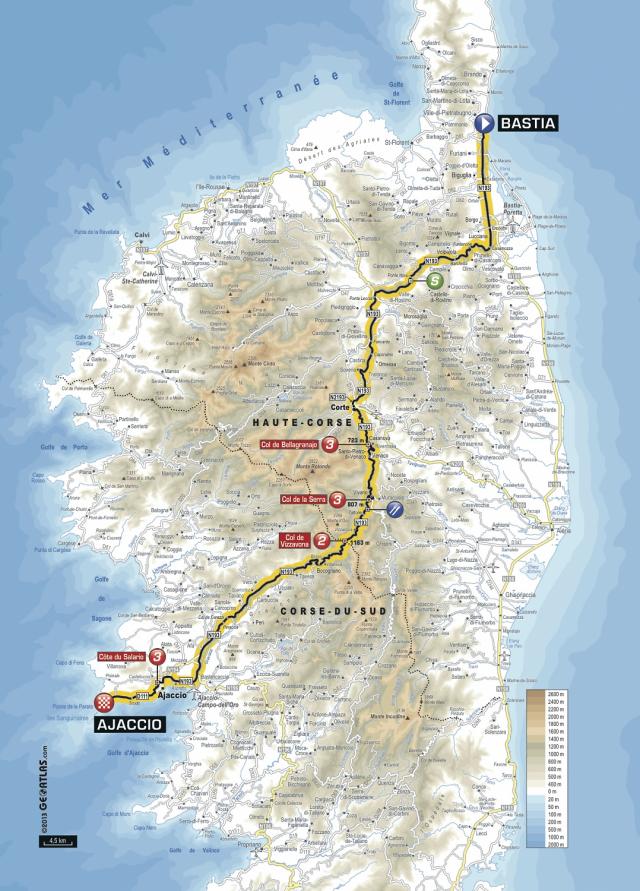
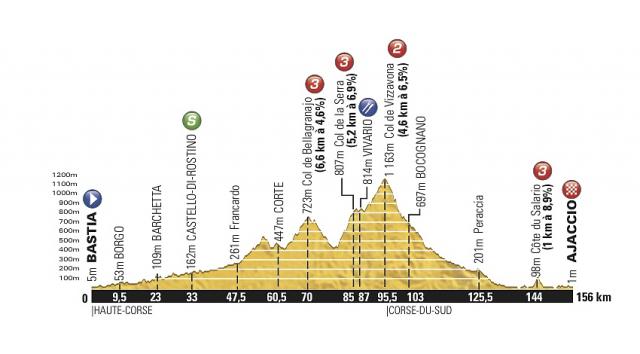
This is the first of a pair of unusually tough stages to feature this early in the Tour. Starting on the coast at Bastia, the route heads across Corsica’s mountainous interior, the biggest of the day’s climbs, the Col de Vizzavona, topping out at 1,163 metres above sea level.
After a long descent, there’s the tough ramp of the Côte du Salario to tackle a dozen kilometres from the finish in Ajaccio. The sprinters will be gone, and it’s not an afternoon when anyone with GC hopes wants to have an off day, or a crash or mechanical – if they do, some real damage could be done, even this early.
Local knowledge: This year’s race is as much as anything else a celebration of France’s history, and the finish town today is the birthplace of the man under whom the country lived some of its greatest – and darkest – moments, Napoleon Bonaparte.
Stage 3
Ajaccio – Calvi (145km)
Monday 1 July
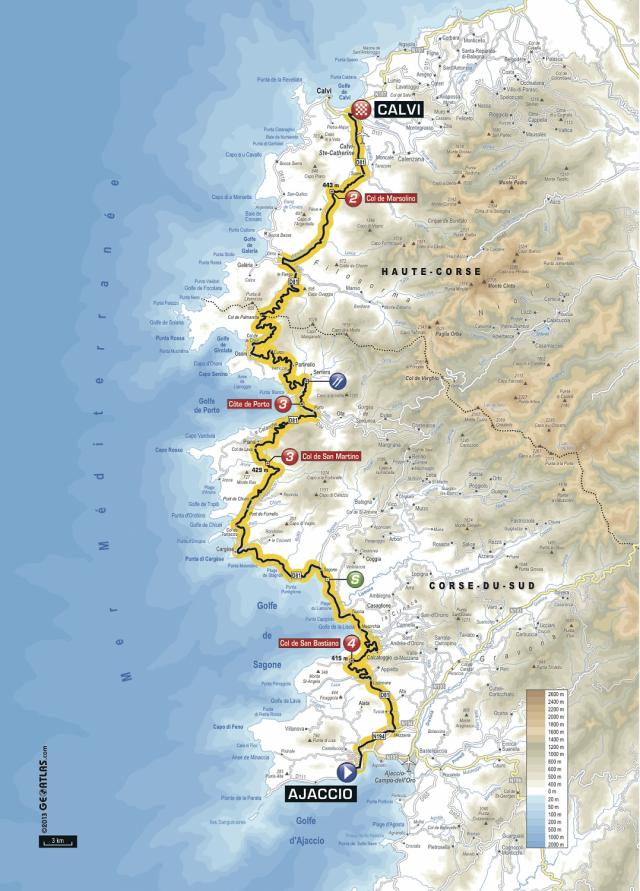
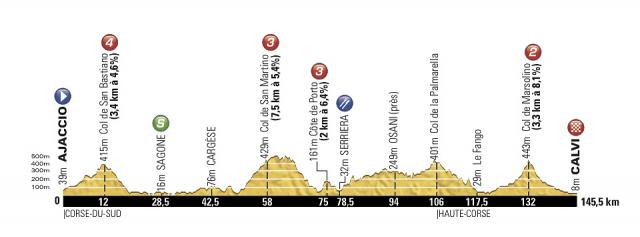
The third and final day on Corsica, this time along the rugged terrain of the west coast of the island with four more categorised climbs to deal with – the first comes straight from the start, and there are another two in close succession either side of the halfway point of a twisting and undulating parcours.
The final climb, the Col du Marsolino, is again near the end of the stage, but is longer and has a steeper average gradient than yesterday’s. The terrain, and the prospect of wind off the coast, means the peloton may have been blown apart well before then –woe betide any overall contenders on the wrong side of a split.
Local knowledge: There’s no doubt Napoleon was born in Ajaccio, but there’s debate over whether Calvi can claim Christopher Columbus as its most famous son. Widely believed to have been born in Genoa, some say he was born in Calvi – the Italian maritime republic ruled Corsica at the time of the explorer’s birth.
Stage 4
Nice – Nice (TTT, 25km)
Tuesday 2 July
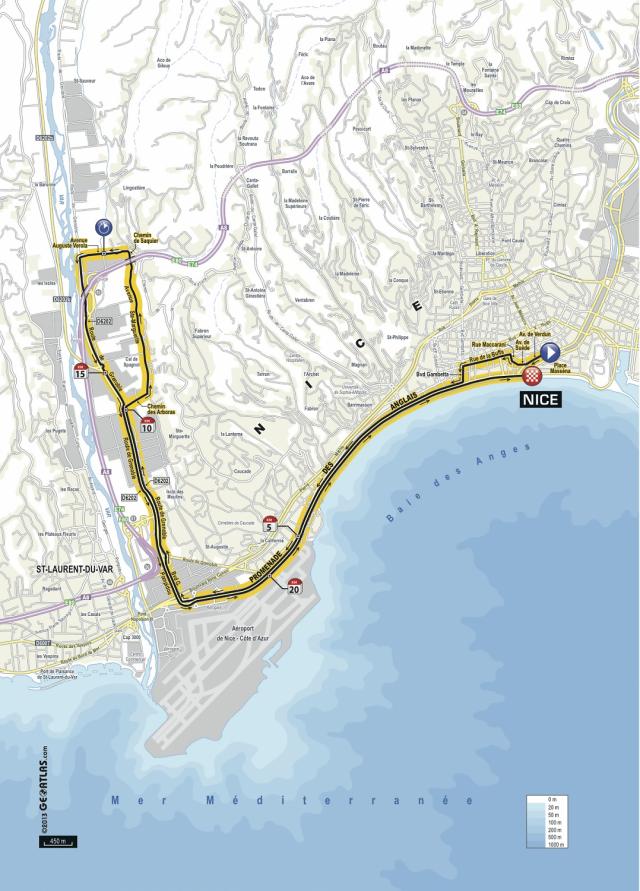

We’re back on the mainland, and appropriately for the glamorous Côte d’Azur, the riders will have jetted in from Corsica the previous evening. There’s no shortage of hills around Nice, but today’s 15km course is about as flat as is possible in this area, including long sections along the Promenade des Anglais.
The time is taken when the fifth rider crosses the line, so a balance needs to be struck between going as fast as the stronger riders can, and ensuring the weaker ones aren’t shed too soon; Omega Pharma-Quick Step are world champions against the clock, but the likes of Sky, BMC and Garmin-Sharp will put up a fight.
Local knowledge: Sky’s Chris Froome, Richie Porte and Geraint Thomas, among others, will be on very familiar ground today – all are residents of nearby Monaco, the principality being served by Nice airport, which the teams will pass twice during the stage.
Stage 5
Cagnes-sur-Mer – Marseille (228.5km)
Wednesday 3 July
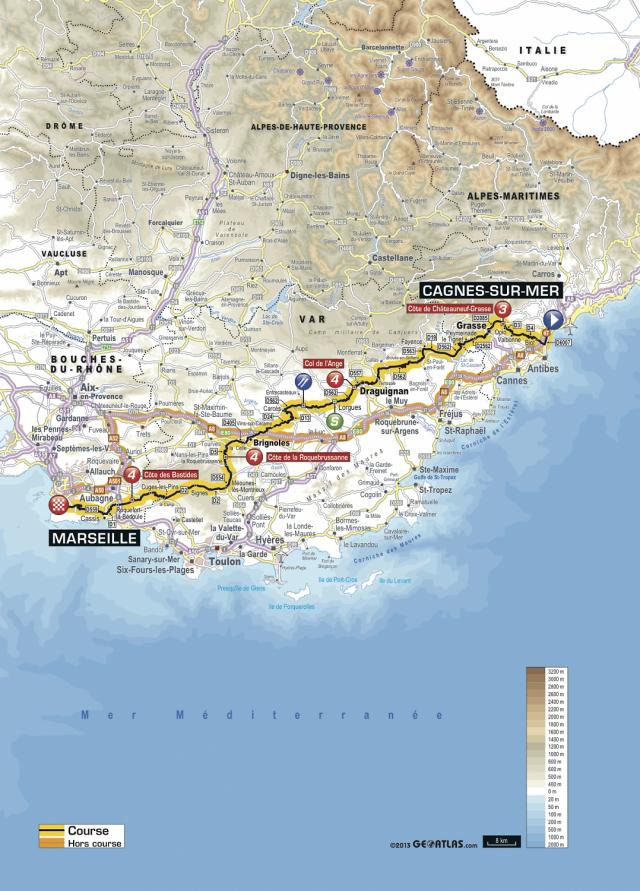

A tough day to predict, with a couple of climbs thrown in late on making it reminiscent of one of those Giro d’Italia stages where it’s 50-50 whether a break will stay away or get caught ahead of the finish. Adding to the uncertainty is the descent from that final climb, although the final 4km sees a flat run-in.
It’s another stage with an undulating profile, with the first of four categorised climbs coming early on – it may take a while for the escapees to get away, but over that summit we should know who’s going to spend the next 200km or so at the front of the race.
Local knowledge: Cagnes-sur-Mer is home to what is now possibly the most (in)famous bike shop in France, and there are plenty of pictures around of current and ex-pros with the owner; we don’t see too many photo opps today, however, given he happens to be the Motoman of US Postal scandal notoriety.
Stage 6
Aix-en-Provence – Montpellier (176km)
Thursday 4 July


Unlike yesterday, today is pretty much a nailed-on bunch sprint. What’s more, with the day’s intermediate sprint coming at 63km, just before the one categorised climb, there may be an incentive for teams with green jersey aspirations to keep the tempo high early on and hunt for points.
One potential complication today is the wind, however; the latter part of the stage is in the same part of the world where HTC-Highroad blew the race apart during the 2009 Tour on a stage won by Mark Cavendish. If echelons do form, some GC contenders may find themselves fighting to get back on.
Local knowledge: Last month, Montpellier was the site of France’s first same-sex marriage made possible through the controversial law pushed through by President François Hollande; protesters have said they’ll use the international profile of the Tour to get their point across.
Stage 7
Montpellier – Albi (205km)
Friday 5 July
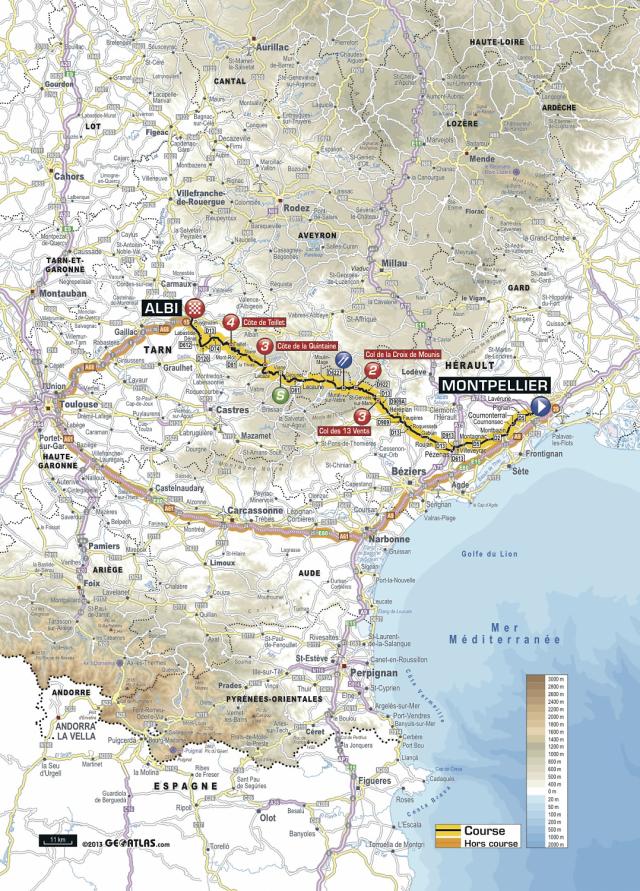
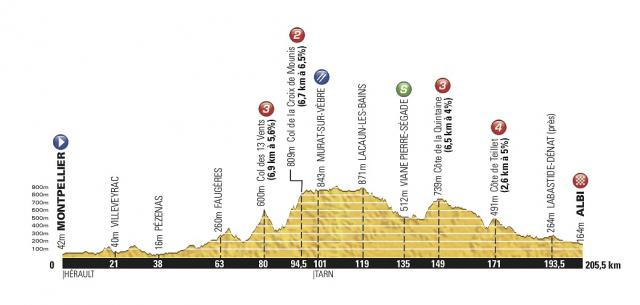
The outcome of today’s stage may well depend on how well the sprinters cope with that pair of Category 2 climbs ahead of the halfway point; if the pace being set by the stronger climbers is high, some may find themselves out of contention even before the halfway point.
That could play into the hands of riders such as defending points champion Peter Sagan; the day’s final climb, the Category 4 Côte de Teillet, comes with more than 30km left to ride, and if the Cannondale rider has shaken off the likes of André Greipel and Mark Cavendish, few would bet against him.
Local knowledge: While Albi gave its name to the Albigensian Crusade – the fortified cathedral you’ll see in the TV shots at the end of the stage a statement of French political intent – many of the key events in that 13th Century campaign by the Catholic church to stamp out the Cathar heresy took place further south.
Stage 8
Castres – Ax 3 Domaines (194km)
Saturday 6 July

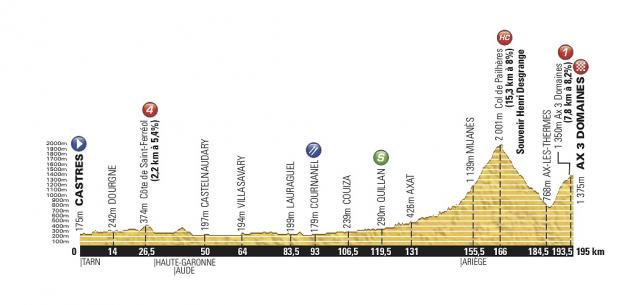
The second Saturday of the 100th Tour de France sees the first high mountain stage, and it’s also the first summit finish of this year’s race, with the final climb, the Category 1 ascent to Ax 3 Domaines preceded by the Hors-Categorie ascent of the Col de Pailhères.
The profile of some of the preceding stages suggests there could already be some big time gaps between those vying for the overall, which could help shape how today’s stage pans out – if one of the podium favourites has lost time on GC already, this could be the day to start attempting to get it back.
Local knowledge: Among the routes the Tour takes into or out of the Pyrenees; this may be the most scenic, heading through the Gorges de l’Aude south of Quillan; some riders will return to that town a fortnight after the race finishes – it’s home to France’s oldest post-Tour criterium, in its 69th edition this year.
Stage 9
Saint-Girons – Bagnères-de-Bigorre (163km)
Sunday 7 July
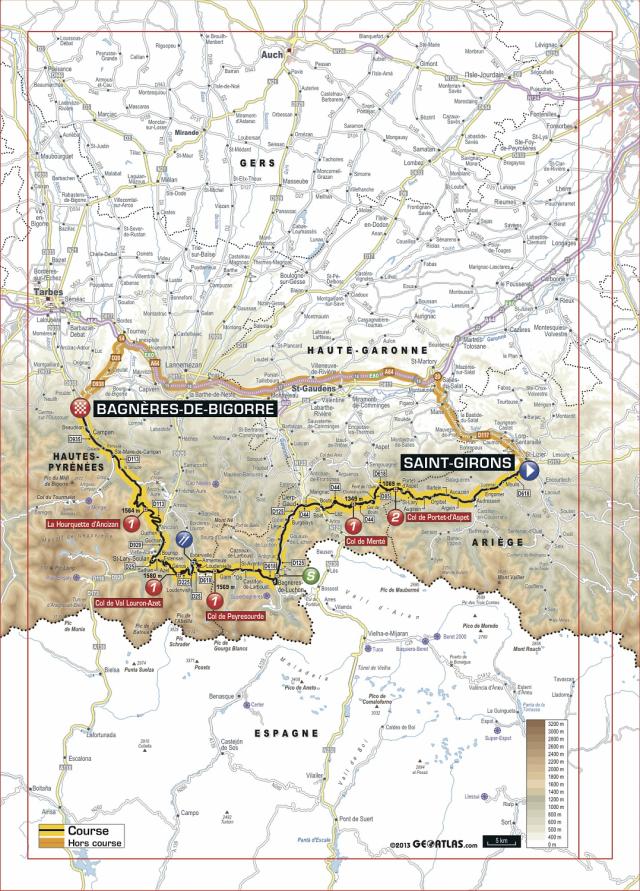
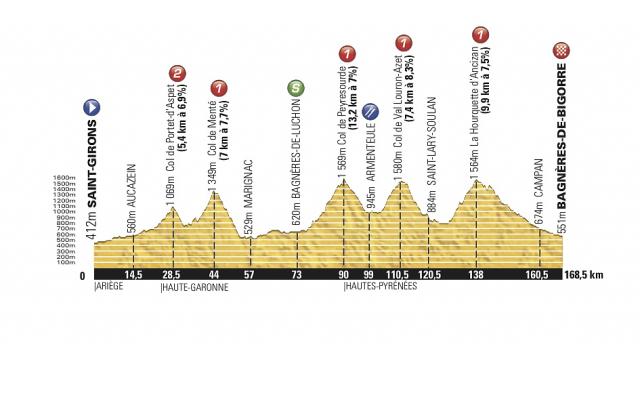
Potentially a big day in the High Pyrenees, with a saw-toothed profile that feature five big climbs – four of them Category 1, including the Col de Peyresourde – ahead of a 30km downhill run to the line in Bagnères de Bigorre, ten times a stage town.
It’s likely to be an attritional day, and one that will see an ever-decreasing field as the race heads over those successive summits, and it’s one that gives Chris Froome’s GC rivals plenty of opportunities to attack and try and upset Sky’s tactic of attempting to control the race from the front.
Local knowledge: Ten times a stage town, the most memorable finish at Bagnères de Bigorre perhaps came in 1963 when Jacques Anquetil, defending champion and already a three-time winner, prevailed in the sprint on his way to winning the fourth of his fifth maillots jaunes.
Monday 8 July – rest day
Stage 10
Saint-Gildas-des-Bois – Saint-Malo (193km)
Tuesday 9 July
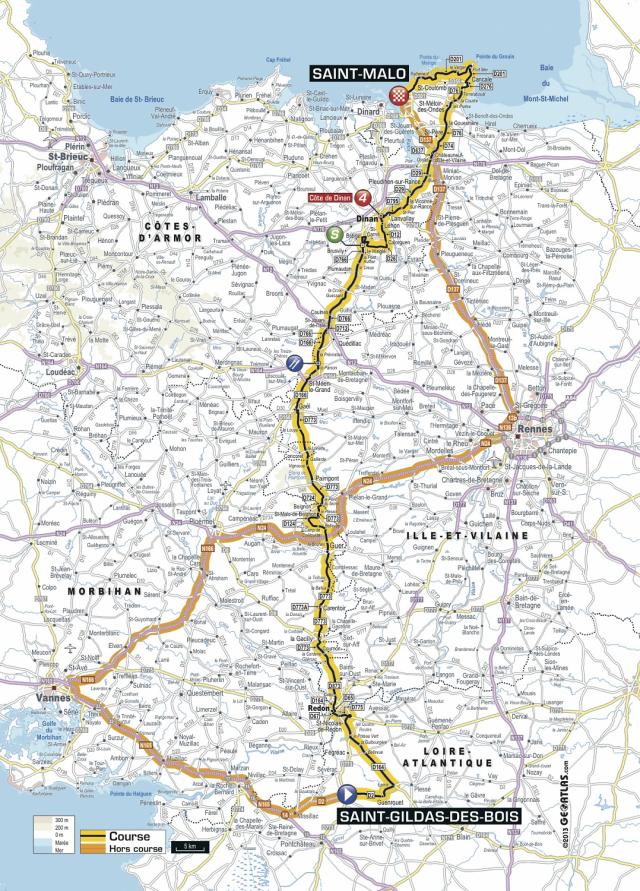
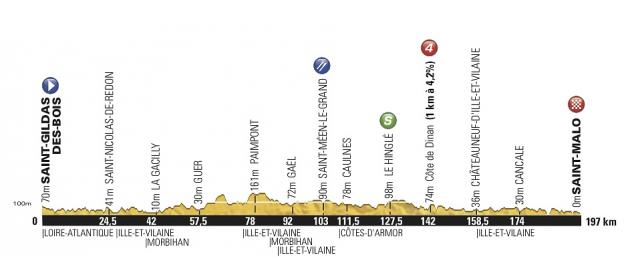
With the race resuming after yesterday’s rest day in Saint-Nazaire, it’s a straight run north pretty much along the line where the Breton peninsula joins the rest of France; but there’s a potential sting in the tail as the route swings west along the coast to St Malo a little over 20km from the end.
After spending the weekend suffering in the Pyrenees, the sprinters will want to return to business, but there’s no certainty it will come down to a bunch finish; there’s just the one Category 4 climb today, but an undulating parcours including towards the finish may give a puncheur a chance of a stage win.
Local knowledge: Today’s finish takes place in sight of the ramparts of the walled city of Saint-Malo, once home to corsairs who raided Channel shipping, and site of a largely unsuccessful British raid in 1758; no such worries over piracy, we hope, for any fans who’ll cross on the ferry for today’s stage.
Stage 11
Avranches – Mont-Saint-Michel (ITT 33km)
Wednesday 10 July


At 33 kilometres, this is a shorter than usual individual time trial for the Tour, and one that finishes against the spectacular backdrop of Mont-Saint-Michel, the second most visited tourist attraction in France after the Eiffel Tower.
It’s a chance of course for the stronger time trial riders among the overall contenders to get some time on their rivals, but that shorter course means there shouldn’t be the gaps that Wiggins and Froome managed to secure last year; as for the battle for the stage, an on form Tony Martin will be unbeatable.
Local knowledge: A stronghold since the Dark Ages, much of Mont-Saint-Michel’s security is owed to the tides, described by Victor Hugo as being “as fast as a galloping racehorse”; from experience, if you’re on the sands and see the tide coming in, you’d better run for the causeway – and quickly. Luckily, we survived.
Stage 12
Fougères – Tours (218km)
Thursday 11 July


Even as we enter the second half of the race, the opportunities for the sprinters are starting to run out – today, tomorrow, and the final day on the Champs-Elysées – meaning any scenario other than a bunch finish as the race heads southeast towards the Loire Valley is unlikely.
The one-day classic, Paris-Tours, shows us that finishes here aren’t always contested by a group. Today, though, there should be enough teams – Omega Pharma-Quick Step, Orica-GreenEdge and Lotto-Belisol among them – looking to lead the chase that it’s hard to see a breakaway group or late attack prevailing.
Local knowledge: Central France’s largest city, Tours’ strategic position has seen it fought over for centuries, visitors including the Romans, Muslims – defeated here in 732AD, halting their northward advance – and Vikings. In World War 2, it suffered heavy bombing from the Germans in 1940 and Allies in 1944.
Stage 13
Tours – Saint-Amand-Montrond (173km)
Friday 12 July
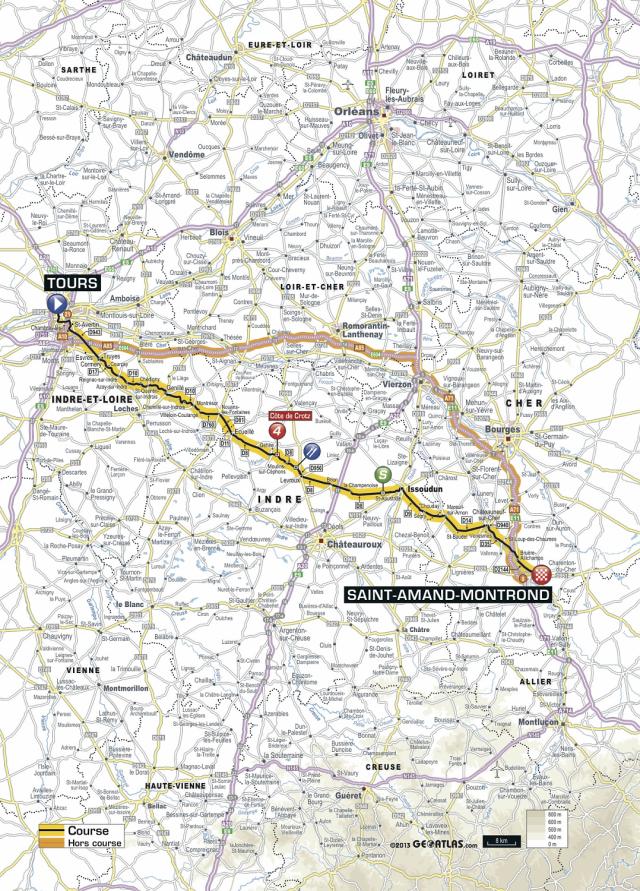
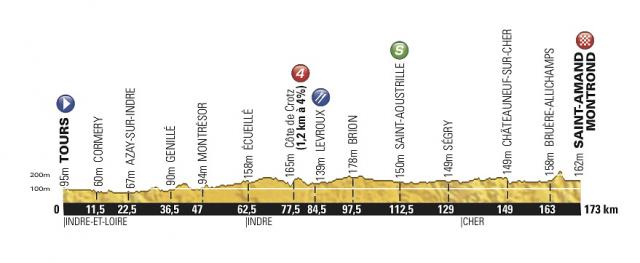
Today’s stage finish is pretty much in the dead centre of France, but while Saint-Amand Montrond has only hosted the race on one previous occasion, it did earn its place in the race’s history as the site of the time trial where in 2008 Carlos Sastre held off Cadel Evans’ challenge to effectively clinch the maillot jaune.
It’s France’s second most important stage race, Paris-Nice, that perhaps gives the best indicator of how today’s finale will go – there have been two stage finishes here since the turn of the Millennium and they’ve both been bunch sprints, with Alessandro Petacchi prevailing in 2002 and Tom Boonen four years later.
Local knowledge: It may only have 11,000 inhabitants, but stage finish town Saint-Amand-Montrond is known for two industries – jewellery, explaining the ‘Cité d’Or’ nickname, and publishing – the Prix Alain-Fournier, named after the author of Le Grand Meaulnes, is awarded at its annual literary festival.
Stage 14
Saint-Pourçain-sur-Sioule – Lyon (191km)
Saturday 13 July
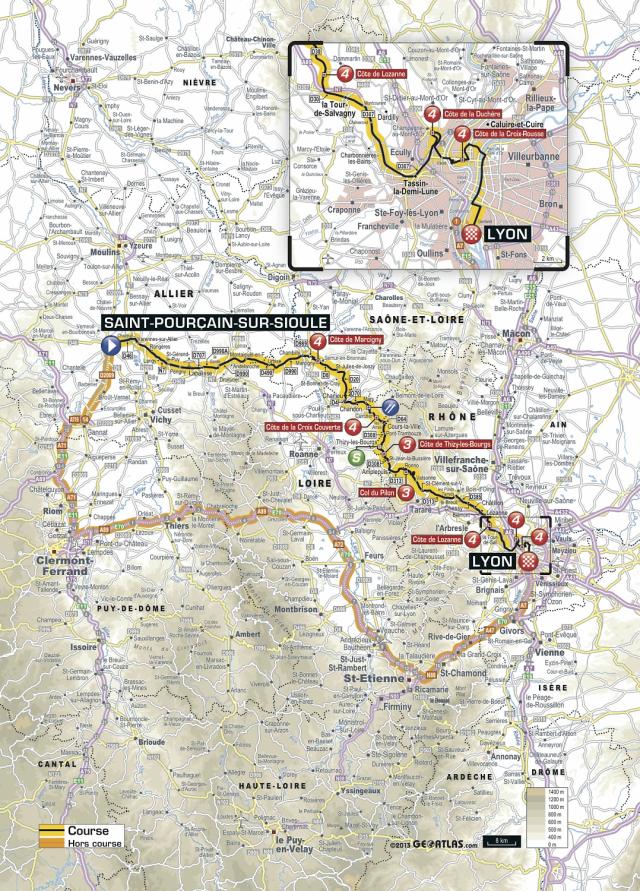
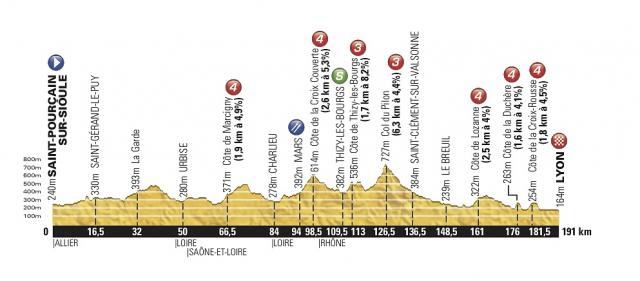
Seven categorised climbs, the last of those being two punchy ascents in Lyon itself, the Côte de la Croix-Rousse and the Côte de la Duchère, mean the pure sprinters will be around to contest the finale, and instead it looks like one for a puncheur – advantage Sagan, perhaps, in the points contest?
But with the Tour about to head into its final week, and some big mountain stages ahead, it could also be a day for a break to stay clear – perhaps one with riders from teams that have little return from the race to date? It’s not Bastille Day till tomorrow, but we can see some French teams having a crack today.
Local knowledge: In a year that celebrates the 100th edition of the race, here’s a stage that ends where the very first one of the Tour de France finished. The distance seems insane today; 467km from Paris to Lyons. Luckily, the next stage wasn’t for another four days. Maurice Garin took the stage and the overall.
Stage 15
Givors – Mont Ventoux (242km)
Sunday 14 July


There’s always huge anticipation among both fans and riders when the Tour tackles Mont Ventoux, and the fact the stage falls on the Fête National will add to the excitement – but there’s more than 220 kilometres of riding ahead of that ascent of the Géant de Provence on the longest stage of the 2013 race.
It promises to be one of the key stages of the 100th Tour, and with a rest day tomorrow, it’s one on which some riders may feel an added incentive to go all out. But in the height of summer, the mountain can be brutal, and any GC contender who struggles with the heat could lose big time today.
Local knowledge: Mont Ventoux is forever linked with the late Tommy Simpson – until recently indisputably the greatest British road cyclist ever; many would still put him top of the list. Fans and riders alike will pay their own tributes to him today as they pass the memorial marking the site of his death.
Monday 15 July – rest day
Stage 16
Vaison-la-Romaine – Gap (168km)
Tuesday 16 July


After Sunday’s ascent of the Ventoux and with big days in the Alps later in the week, this looks like a transitional stage, perhaps one for teams with slim pickings so far to try and rescue their Tour and keep sponsors happy. Possibly a big break getting away today, but there could also be some GC action at the end.
The Col de Manse, a 9.5 kilometre climb at an average gradient of 5.2 per cent, crested 11.5 kilometres out, looks likely to make the selection that will include today’s winner – although ultimately, the subsequent descent could prove decisive.
Local knowledge: Gap is a regular gateway to the Alps, and stages that finish here tend to be characterised by explosive riding –winners here include Alexandre Vinokourov, Pierrick Fédrigo and Thor Hushovd, the latter in the rainbow jersey during the 2011 race, when he had earlier worn the maillot jaune.
Stage 17
Embrun – Chorges (ITT 32km)
Wednesday 17 July
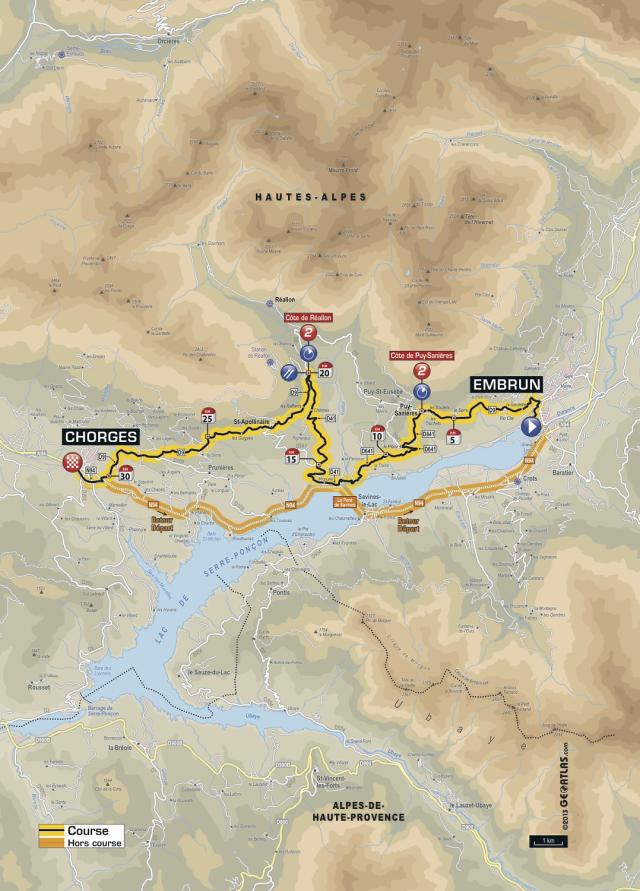
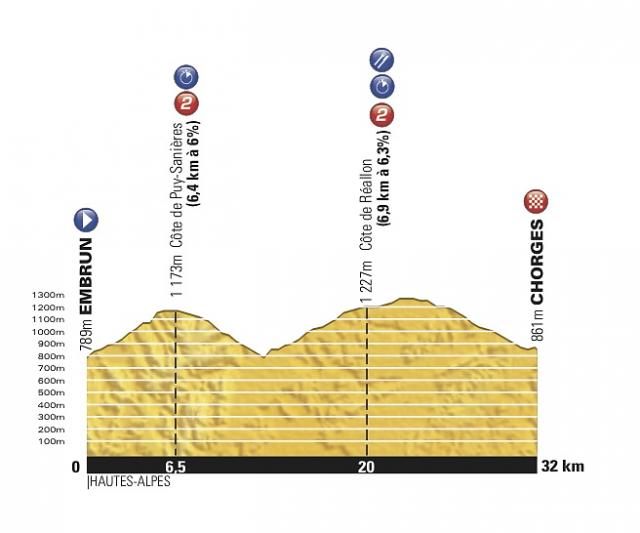
It’s an interesting course for the second individual time trial of the race; not a pure mountain time trial that heads steadily upwards from the start to the finish, but the two categorised climbs certainly make it much more of a challenge than a more gently undulating parcours would have been.
So it’s a course that will suit stronger time trial riders among the GC contenders – Froome, Contador, Evans– but which also gives an opportunity to pure climbers who might struggle to limit losses against the clock on a flatter parcours.
Local knowledge: If nothing else, it’s a pretty setting today, the early part of the course running alongside the artificial lake of Saint-Ponçon, one of Europe’s largest man-made lakes. The area is home to the Embrunman triathlon, which sees its 30th edition a month after the Tour’s visit.
Stage 18
Gap – Alpe d’Huez (168km)
Thursday 18 July
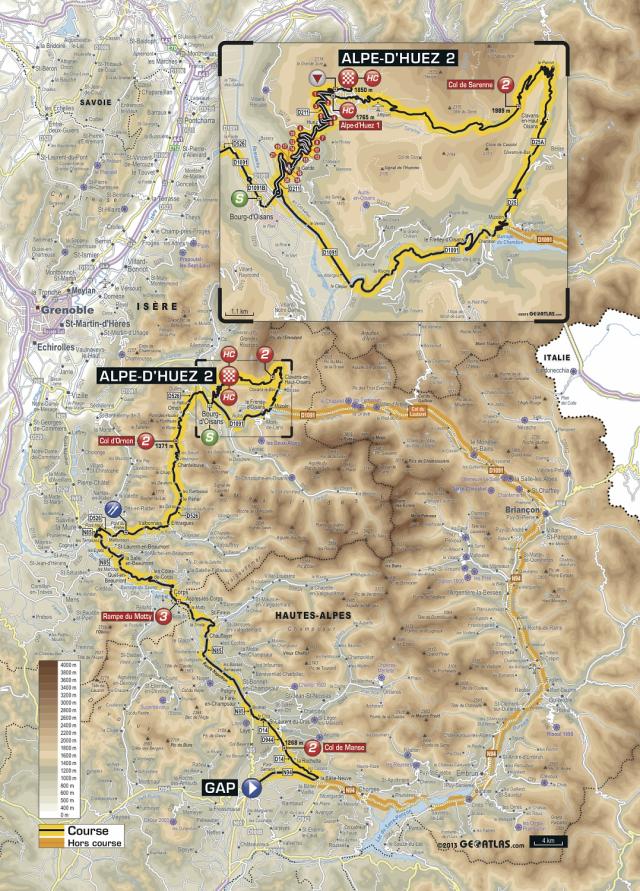
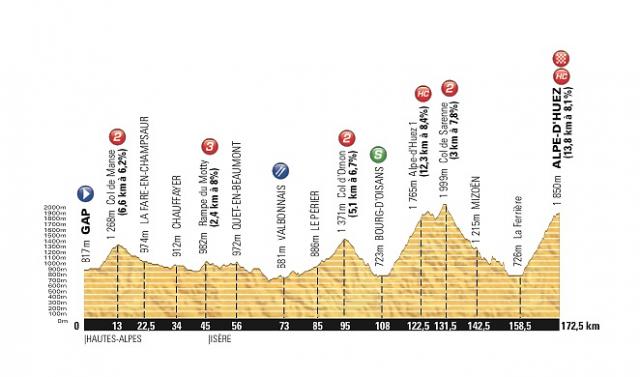
Spare a thought for whoever is leading today’s stage when it crosses the finish line on top of the Alpe d’Huez for the first time; unlike previous riders to have done so ever since Fausto Coppi won the maiden stage here in 1952, he won’t have his name preserved on one of the 21 famous hairpins.
That’s because the race will tackle what is one of the great theatres of cycling twice, making this the showpiece stage of the 100th edition. What’s more, there will be around an hour and a half between the two ascents – any Alpe d’Huez stage sees the fans whipped into a frenzy, but today could be particularly messy.
Local knowledge: Nowadays, it’s disappointing when the Tour’s route doesn’t include Alpe d’Huez, but its debut in 1952 was anything but romantic; local businessmen clubbed together pay for the race’s visit and promote the resort. The Tour wouldn’t return for another 24 years.
Stage 19
Le Bourg d’Oisans – Le Grand-Bornand (204km)
Friday 19 July
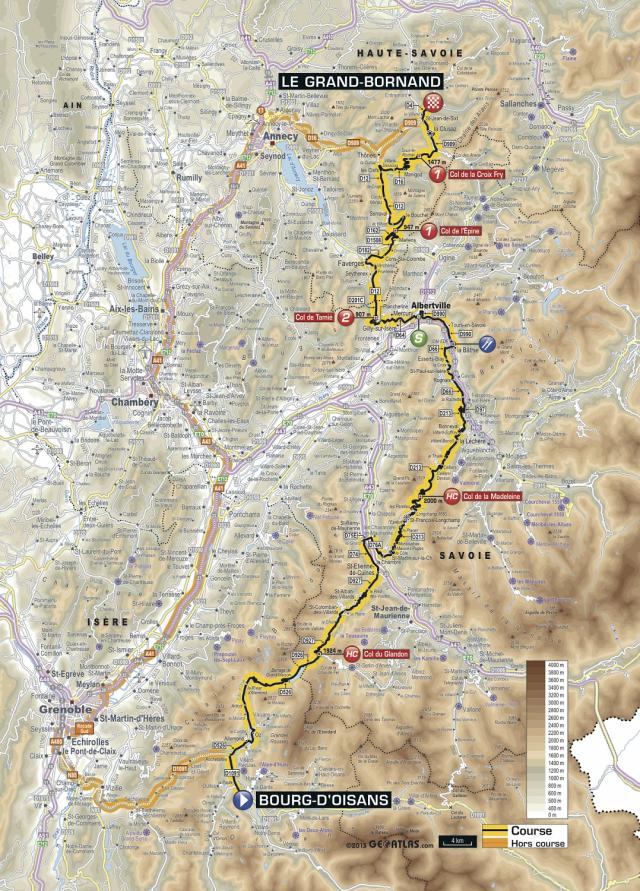
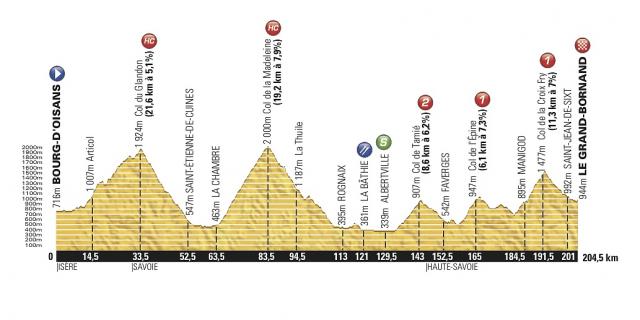
Whatever yesterday’s drama on the Alpe d’Huez, there are still two more big days in the Alps before Sunday’s ride into Paris. The first sees two Hors-Categorie climbs – the Col du Glandon and Col de la Madeleine – early on, the second of those a near 20-kilometre slog at an average gradient of 7.9 per cent.
Quite how these two stages will pan out may depend on how the GC looks. If there are big gaps, then the teams of the men occupying the podium positions may be content to sit back and let a break go; but if it’s tight, we could see a very select group fight it out on today’s final climb before the descent to the finish.
Local knowledge: London may have enjoyed a much-hyped Summer of Sport last year, but in 2013, the 2,200 inhabitants of Le Grand-Bornand are getting the year-long treatment – the Tour de France, the Tour de l’Avenir, Biathlon World Cup and the World Military Winter Games all feature on the calendar.
Stage 20
Annecy – Mont Semnoz (125km)
Saturday 20 July
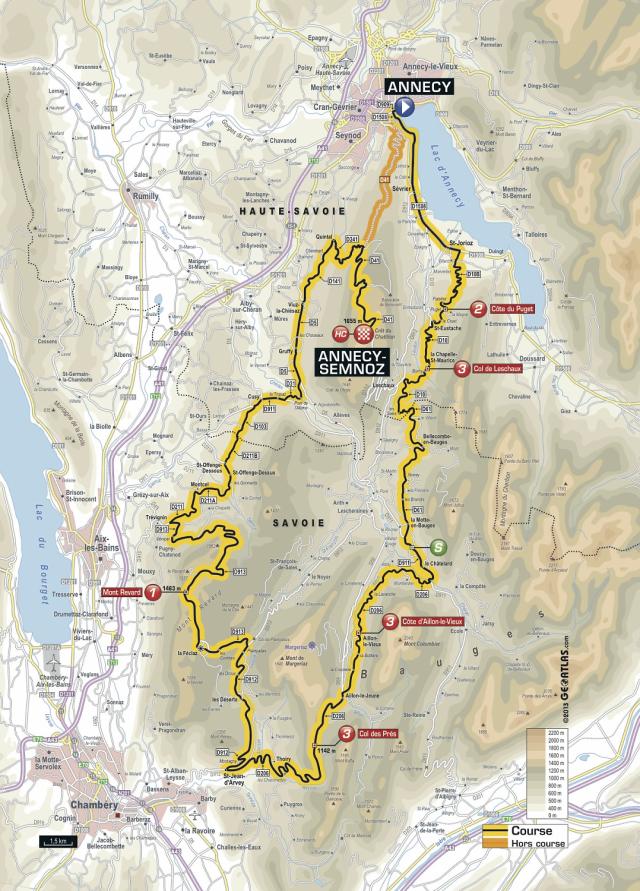

By this evening, we’ll know the identity of the men who will occupy the podium in Paris tomorrow night, but with an Hors-Categorie summit finish at the end of this stage, it’s entirely possible there will be some reshuffling of the order towards the top of the GC.
That final climb of Mont Semnoz covers 10.7 kilometres at an average gradient of 8.5 per cent, but there are long sections when it nudges double figures; long enough and sufficiently tough, in other words, for the Tour to be won or lost, depending what the time gaps were this morning.
Local knowledge: It’s surprising the Tour doesn’t visit Annecy more often – half a century elapsed between its first two visits, the latter seeing Alberto Contador seal the overall in a time trial in 2009. Cézanne’s painting of the lake the town sits on – one of his most powerful works – hangs in London’s Courtauld Gallery.
Stage 21
Versailles – Paris Champs Élysées (118km)
Sunday 21 July


We’d usually talk about the “traditional” final stage into Paris, but to celebrate the end of the 100th edition of the race, some twists break with the format established in the 1970s; an evening finish, a little before 10pm local time, and going round the back of the Arc de Triomphe, lit yellow for the occasion.
Some traditions are harder to dispense with; it’s still a stage for the sprinters, and above all Mark Cavendish, who has never been beaten here and is aiming for a fifth straight win on the most famous finish line in cycling. If the points jersey is still in play, that will add extra spice.
Local knowledge: The start at Versailles means the final stage of the 100th Tour will evoke memories of the 1989 race that marked the 200th anniversary of the French Revolution, with Greg LeMond beating Laurent Fignon by just 8 seconds; rumours this year’s race would also end with a time trial proved unfounded.
Simon joined road.cc as news editor in 2009 and is now the site’s community editor, acting as a link between the team producing the content and our readers. A law and languages graduate, published translator and former retail analyst, he has reported on issues as diverse as cycling-related court cases, anti-doping investigations, the latest developments in the bike industry and the sport’s biggest races. Now back in London full-time after 15 years living in Oxford and Cambridge, he loves cycling along the Thames but misses having his former riding buddy, Elodie the miniature schnauzer, in the basket in front of him.
Latest Comments
- miffed 2 hours 16 sec ago
There's also the specific problem around where this Specific accident happened, it's a very steep very fast road with lots of parked cars and...
- Aluminium can 2 hours 6 min ago
NICE but: this is exactly we need more silver groupsets and rims.
- David9694 3 hours 8 min ago
First para bit of a bitter pill. When you're in a public service with an enforcement power, people will try in all sorts of ways, to play you. You...
- richliv 3 hours 22 min ago
Dunno if this thread is really still live as its dated 2021 but I'll assume its reanimated so......
- ktache 3 hours 59 min ago
Torx is the future, it will slowly replace hex, much as my bicycle now lacks 10mm spanner heads, or screw heads, (apart from the JIS Shimano...
- ktache 4 hours 16 min ago
The better half was driving us down the M3 as it was becoming a "smart" motorway, 50mph average enforcement, everyone at the same speed, no lane...
- slitemere 4 hours 54 min ago
So sad that there is no 11 speed cable operated brake option what about the retro market for people who want to update their old rim brake frames?...
- Gbjbanjs 6 hours 54 min ago
I think you are right about being too close to the vehicle in front. However, the fact that the lead rider had to take evasive action to avoid a...
- anke2 7 hours 6 min ago
Check their website. These "inventors" run a social media agency and seem to make most (startup) money from a business selling pictures/movies of...




























Add new comment
5 comments
Long live the Tour de France: 100 years of chemically & pharmaceutically inspired sports.
And for those who want to think there was ever a time when the Tour was clean, i have a secret to share: there really is no Santa Claus. Shhhhhhhhhhhhhhhh ..........
Now then, just enjoy the spectacle as it is for the moment. Because it is impressive.
Unfortunately while Giro organisers RCS Sport are more than happy to share info, ASO keep things under a tighter leash - hard enough for us to find one; having said that, I'm pretty sure that once an electronic version is out there, it will end up on a sharing site so you may want to keep an eye on the Forum posts in the week or so ahead.
Great preview Does anyone know if there is a link to the road book like there was for the Giro? I found that extra detail very useful trying to decide whether a breakaway is likely to stick for my fantasy team.
Does anyone know if there is a link to the road book like there was for the Giro? I found that extra detail very useful trying to decide whether a breakaway is likely to stick for my fantasy team.
I don't care who wins, but I want to see racing and not domination. Of course if the winner is British then I may enjoy it more
+1